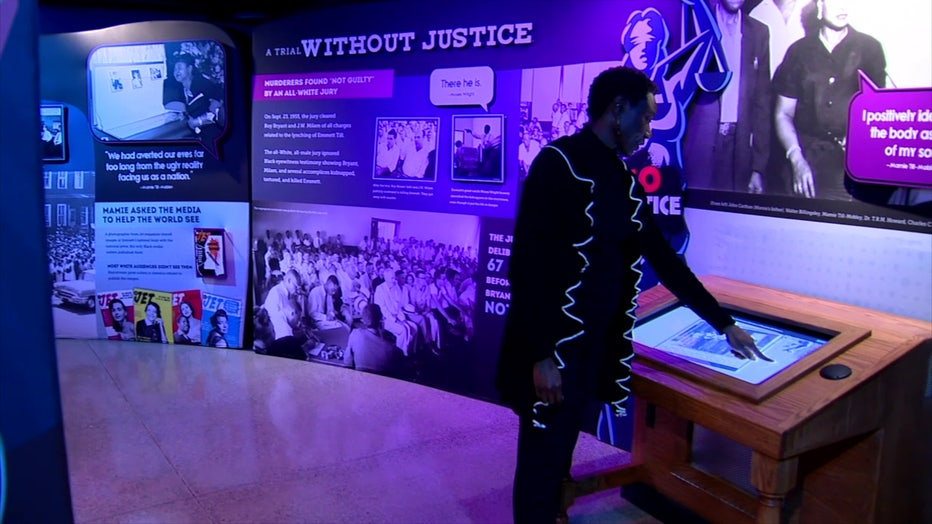Emmett Till's story: Seattle museum turns pain into purpose with Juneteenth exhibit
SEATTLE - Juneteenth — it’s a term we’ve heard a lot more in recent years. A day representing freedom for Black and African Americans, Juneteenth commemorates June 19, 1865 — the day enslaved African Americans in Texas were told they were finally free, two-and-a-half years after president Abraham Lincoln signed the Emancipation Proclomation.
So, how do you celebrate freedom? The answer is multi-faceted and complicated.
The Northwest African American Museum (NAAM) is taking on the challenge with an immersive exhibit, taking you back in time. But maybe not as far as you think.
"I like that it’s in this old school," said Loytavian Harrell at NAAM.
Harrell took a portal to the past, walking back in time in hopes of moving forward.
"I kind of hesitated to walk in here because it is such a heavy story," she said. "He was just a kid."

68 years ago, one mother wanted "the world to see." His name was Emmett Till, a name synonymous with the civil rights movement.
In August 1955, while visiting family in Mississippi, 14-year-old Till was kidnapped, lynched and brutally murdered.
He was accused of whistling at 21-year-old Carolyn Bryant, a white woman who told her husband Roy Bryant that Till sexually harassed her. Four days later, Bryant and his half brother J.W. Milam kidnapped Till, beat, shot and lynched him, then dumped his mutilated body in the Tallahatchie River.
When Till’s corpse was found in the river, both men were charged, but they were acquitted by an all-white jury. Bryant and Milam later bragged about killing Emmett Till during a magazine interview.
And six decades later, Carolyn Bryant admitted she lied about Till sexually harassing her and lied the entire time in court.
But before the justice system would go on to fail the Till family, Emmett’s mother, Mamie Till, decided the world would see the horrific truth.
She held an open casket viewing for five days — changing the trajectory of the civil rights movement.
"To see what he looked like after they tortured him," said retired teacher Lauren Tozzi.
Now, under blue and purple hues, his story has been reimagined in a new exhibit. One again for the world to see.
The old image — bringing fresh tears to Lauren Tozzi’s eyes.
"We just can’t forget our country was founded on racism," Tozzi said.
It's a concept the Northwest African American Museum isn’t afraid to tackle.
"While Juneteenth to me and our team at its heart is about joy, the initial joy about being free, we don’t think it would completely be authentic to celebrate Juneteenth without reflecting on the totality of the Black experience in our nation," said Brandon Bird, interim executive director and vice president of operations at NAAM.
The NAAM is the only Black history museum in the Pacific Northwest.
"Even though the Emmett Till story started back in 1955 it is still relevant to this day," Bird said.
"How they put up numerous plaques to commemorate that spot and the plaques have been shot at, defaced things of this nature, that I will think about for a very long time," Harrell said.
But this story, this exhibit, and this museum isn’t about defeat.
"It means community, it means resilience," Bird said.
If you would like to visit the exhibit inside NAAM, you can see it on Wednesday for free. The museum is offering free admission on Juneteenth from 10 a.m. to 3 p.m.
Along with the exhibit, there will also be arts and crafts for kids, and a book giveaway with information on Juneteenth and the history behind it.
MORE FOX 13 SEATTLE NEWS:
Insurance companies drop SODO businesses due to high crime rates
Willie Mays dies: Giants legend and MLB Hall of Famer was 93
Boeing CEO apologizes to families of 737 Max crash victims during Senate panel testimony
Pierce County deputies investigate fatal crash, stabbing in Parkland
To get the best local news, weather and sports in Seattle for free, sign up for the daily FOX 13 Seattle newsletter.

